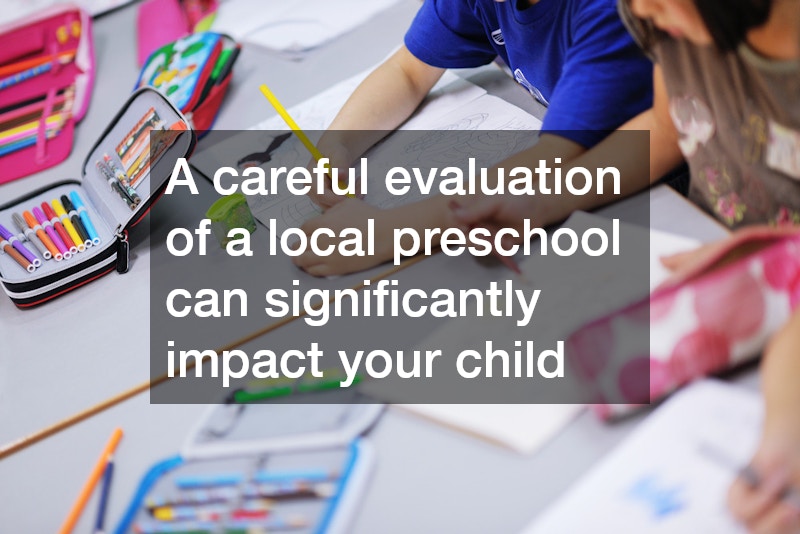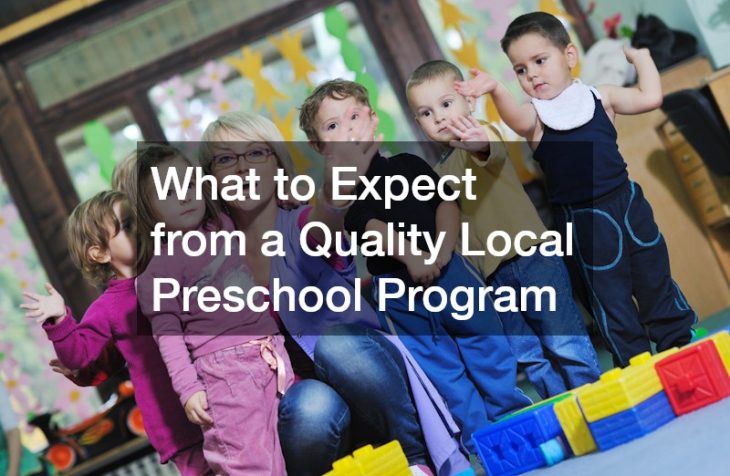What to Expect from a Quality Local Preschool Program

Choosing the right preschool for your child is a critical decision that sets the foundation for their educational journey. Parents often endeavor to find a local preschool that not only aligns with their expectations but also nurtures their child’s development. In this article, we will explore what constitutes a quality program and what parents can expect when enrolling their children.
The emphasis on early childhood education has highlighted the importance of selecting a preschool that fosters a love for learning. Many preschool programs aim to create an environment that is both academically stimulating and emotionally supportive. Understanding the key attributes of such programs can make this decision easier for parents.
A quality local program integrates various teaching methodologies to cater to the diverse needs of children. These programs often employ a structured curriculum that encourages holistic development. This article will discuss the features that parents should consider when choosing a local preschool for their child.
Comprehensive Curriculum
An effective preschool program features a comprehensive curriculum that balances academics, play, and socialization. This curriculum is typically designed to prepare children for the next stages of education by introducing them to basic concepts in math, science, and language. Additionally, preschools often include art and physical education to promote creativity and physical development.
Quality preschools understand that young children learn best through engaging and interactive activities. Teachers are trained to provide instruction that is hands-on and exploratory, stimulating curious minds and encouraging inquisitiveness. In a supportive environment, children are motivated to ask questions and engage in problem-solving tasks.
Customization and adaptation within the curriculum allow teachers to address the unique needs of each child. This approach not only supports individual learning styles but also fosters an inclusive environment. Parents should look for local preschool programs that emphasize the importance of adapting their teaching strategies to meet the diverse needs of their students.
Qualified and Passionate Staff
The backbone of any quality program is its staff, who play a crucial role in creating a nurturing learning environment. Qualified teachers possess the necessary credentials and experience to work with young children, ensuring that they receive appropriate guidance and care. Moreover, passionate educators are committed to lifelong learning and continually seek to improve their teaching practices.
Preschool teachers in a quality program are trained to identify and understand the developmental milestones of children. They provide individualized attention and support that fosters growth in cognitive, emotional, and social domains. Parents should expect open communication from teachers who share insights about their child’s progress and involve them in the educational process.
Professional development opportunities are vital for preschool educators to maintain high standards of teaching. Local preschools often encourage staff to attend workshops and training sessions, which keep them updated on the latest educational practices. Such initiatives ensure that the children benefit from the most effective teaching methods available.
Safe and Stimulating Environment
Safety is of utmost priority in any early childhood educational setting, and quality preschools adhere to high standards to ensure this. Childproofing measures, emergency protocols, and regular inspections contribute to a safe environment for children to learn and play. Parents should inquire about the preschool’s safety policies to ensure their child’s well-being.
A stimulating environment complements safety by offering children a space that sparks their imagination and creativity. They achieve this by providing well-equipped classrooms with diverse learning materials, such as books, toys, and art supplies. Outdoor play areas are also integral, offering opportunities for physical activity and nature exploration.
The physical layout of the preschool, including classroom setup and accessibility, plays a significant role in a child’s learning experience. An organized and inviting space fosters independence and collaboration. Parents should visit local preschool facilities to assess how these elements contribute to a conducive learning environment.
Parental Involvement and Communication
A hallmark of a quality local preschool program is the encouragement of parental involvement, recognizing parents as partners in the educational journey. Schools often offer opportunities for parents to participate in classroom activities, field trips, and school events. This involvement strengthens the connection between home and school, benefiting the child’s overall growth.
Open and consistent communication between teachers and parents is essential for tracking a child’s development. Quality preschools provide regular updates through newsletters, progress reports, and parent-teacher conferences. These communication channels allow for a collaborative approach to the child’s education, addressing any concerns or milestones.
Technology plays a growing role in maintaining communication between preschools and families. Many schools use digital platforms to share updates, resources, and photos. This integration of technology ensures that parents are actively informed and involved in their child’s preschool experience.
A quality local program offers a robust foundation for a child’s future academic and social success. By focusing on a comprehensive curriculum, qualified staff, a safe environment, and active parental involvement, these programs meet the key needs of early childhood education. As parents evaluate their options, finding the right preschool involves understanding these elements and how they align with their child’s needs.
Ultimately, the choice of a local preschool should prioritize a nurturing atmosphere where children can thrive and explore their potential. The right preschool encourages the development of lifelong learning skills and fosters a love for education. By considering the elements discussed, parents can confidently select a program that best suits their child’s educational journey.
A careful evaluation of a local preschool’s program offerings, staff credentials, facilities, and community engagement can significantly impact a child’s initial learning experiences. Parents are encouraged to visit prospective preschools, ask questions, and trust their instincts. By doing so, they provide their children with a strong start on their educational path.

